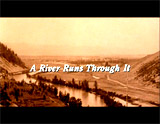
|
A River Runs Through It (1992)
In director Robert Redford's dramatic adaptation of
Norman Maclean's 1976 novel about coming-of-age, with mystical cinematographic
beauty in the entire picturesque and poetic film (shot by Academy
Award-winning Philippe Rousselot), especially the thrilling Big Blackfoot
River fly-fishing scenes:
- the opening voice-over narration of an older Norman
Maclean (voice by Robert Redford): "Long ago, when I was a young
man, my father said to me, 'Norman, you like to write stories.'
And I said, 'Yes, I do.' Then he said, 'Someday, when you're ready
you might tell our family story. Only then will you understand
what happened and why'"
- beautiful and lyrical voice-over narration followed:
"In our family, there was no clear line between religion and
fly-fishing...My father was a Presbyterian minister - and a fly-fisherman";
the film opened with devout and strict Presbyterian Reverend Maclean (Tom Skerritt),
also a fly-fisherman (with a love for nature and God), walking along the banks of the Big
Blackfoot River ("which we considered our family river") with his
two young boys, Paul (Vann Gravage as boy) and Norman (Joseph Gordon-Levitt
as boy); they were told to listen to the 'voice' of God in nature:
"Long ago rain fell on mud and became rock. Halt a billion years ago.
But even before that, beneath the rocks are the words of God. Listen.
And if Paul and I listened very carefully all our lives, we might
hear those words"
- Rev. Maclean taught the two boys how to fly-fish,
using a metronome to establish the rhythm: "So
my brother and I learned to cast Presbyterian style: on a metronome.
He began each session with the same instruction: Casting is an art
that is performed on a four-count rhythm between 10 o'clock and 2
o'clock. If he had had his way, nobody who did not know how to catch
a fish would be allowed to disgrace a fish by catching it..."
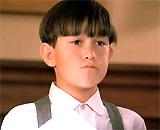
|
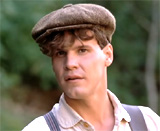
|
|
Young Norman (Joseph Gordon-Levitt)
|
Norman (Craig Sheffer)
|
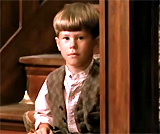
|
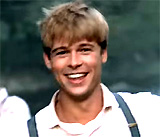
|
|
Young Paul (Vann Gravage)
|
Paul (Brad Pitt)
|
- the film told the story of two brothers growing up
together: the older, more studious, strait-laced and intellectual
Norman (Craig Sheffer as adult) (a future writer/novelist) and rebellious
and tough Paul (Brad Pitt as adult); both boys grew up in Missoula,
Montana in the 1920s under the home-schooling tutelage of their
father Rev. Maclean; in the afternoons, young Norman remembered how
he was free to play in God's nature: "Every afternoon, I was
set free, untutored and untouched till supper to learn on my own
the natural side of God's order. And there could be no better place
to learn than the Montana of my youth. It was a world with dew still
on it, more touched by wonder and possibility than any I have since
known"
- the scene of the two older boys recklessly attempting
to run the rapids ("shoot the chutes") in a stolen ("borrowed") rowboat,
and navigate down the dangerous falls on the Big Blackfoot River
- the teenaged boys were sometimes contentious and competitive
with each other; for example, in the scene in the kitchen, when Paul
demanded that Norman put "ham, cheese and sardines" on his sandwich,
the two began a knock-down fist-fight; their mother Mrs. Clara
Maclean (Brenda Blethyn) came between them to break up their bloody
conflict; later, Norman recalled: "That was the only time we ever
fought. Perhaps we wondered afterwards which one of us was tougher.
But if boyhood questions aren't answered before a certain point,
they can't be raised again. So we returned to being gracious to one
another, as the church wall suggested"
- during a sublime afternoon
of fly-fishing with their father, Norman noted that Paul had adopted
his own unique way to fly-fish: "I then saw something remarkable. For
the first time, Paul broke free of our father's instruction into a
rhythm all his own" - with a special 'artistic' technique (later known
as "shadowcasting"); afterwards, their father congratulated the trout
caught by each of his two sons: "They're both marvelous. I'd say the
Lord has blessed us all today," but then pulled out his even larger
trout catch to compare: " It's just that He's been particularly good
to me" -
chuckling to himself as he walked away from the river
|
Fly Fishing With Their Father - Paul's Unique Technique
|
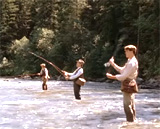
|
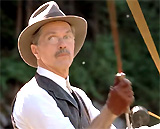
|
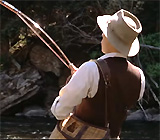
|
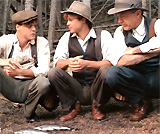
|
- in the war years, Norman worked in the US
Forest Service as a 16 year old, and Paul served as a lifeguard;
then, Norman spent six years studying at Dartmouth University and
during that time, Paul continued to perfect his fishing skills and
became a "fishing newspaperman" (muckraker) for a Helena newspaper:
("On the other hand, Paul stayed home for college, unwilling to leave
the fish he had not yet caught. After graduation, he took a job as
a reporter for a Helena newspaper and moved to that town")
- when Norman
returned, he began to fall in love with Jessie
Burns (Emily Lloyd) at a 4th of July dance, while Paul (with a reputation
for gambling and drinking and falling into debt) was dating a Native
American girl friend named Mabel (Nicole Burdette), and faced racial
prejudice for associating with a woman deemed inferior
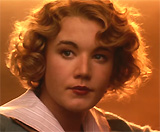
|
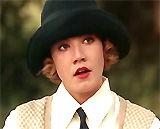
|
|
Jessie Burns (Emily Lloyd)
|
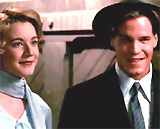
|
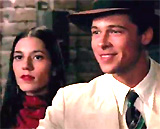
|
|
Norman with Jessie
|
Paul with Mabel
|
- the clear statement of priorities established by Paul:
"In Montana, there's three things we're never late for: church, work
and fishing"
- during a summer fishing expedition, Norman told Paul
that he was going to marry Jessie: ("I'm going to ask Jessie to
marry me"); he had been offered a job teaching literature at the
University of Chicago in Illinois, and invited Paul to come along,
to get away from his local troubles - i.e., gambling debts: ("Why
don't you come with us to Chicago? It's 2,000 miles away. They've got
more than a dozen papers there. You'd be right in the middle of things"),
but Paul declined: "Oh,
I'll never leave Montana, brother"
- in the next scene (the last time they all fished together),
Paul caught a prized rainbow trout on his line (and held on as he
was dragged downstream and never gave up), as Norman and Rev. Maclean
watched and marveled; Norman spoke in voice-over: ("At that moment
I knew surely and clearly that I was witnessing perfection....My
brother stood before us, not on a bank of the Big Blackfoot River,
but suspended above the earth - free from all its laws, like a work
of art") - but then he added: "And I knew just as surely, just as
clearly, that life is not a work of art, and that the moment could
not last"
- soon after, tragic news came that Paul was beaten
to death by the butt of a revolver and his body
was dumped in an alley way - and nearly all the bones in his right hand
were broken; Norman remembered (in voice-over) how thoughts of Paul
never left their father - as a montage of images was presented: "As
time passed, my father struggled for more to hold on to, asking me
again and again: had I told him everything. And finally I said to
him, 'Maybe all I really know about Paul is that he was a fine fisherman.'
'You know more than that,' my father said, 'he was beautiful.' And
that was the last time we ever spoke of my brother's death. Indirectly,
though, Paul was always present in my father's thoughts"
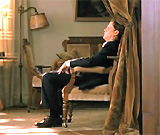
|
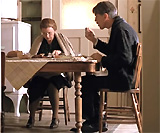
|
|
Norman Reacting to News of Brother Paul's Death
|
Montage: The Stunning Impact of the News of Paul's
Death on Rev. Maclean
|
- Norman recalled (during a trip home from Chicago) the last
sermon he heard his father deliver not long before he died - exemplifying
how people often elude others’ attempts to help them - but
should continue to be loved - no matter what. "Each
one of us here today will at one time in our lives look upon a loved
one who is in need and ask the same question: We are willing to help,
Lord, but what, if anything, is needed? For it is true, we can seldom
help those closest to us. Either we don't know what part of ourselves
to give or, more often than not, the part we have to give is not
wanted. And so, it is those we live with and should know who elude
us. But we can still love them - we can love completely without complete
understanding"; nostalgic memories of
his boyhood flooded over Norman, seen in sepia-tone
- the sequence of the
haunting final words of an older Norman Maclean (Arnold Richardson)
were heard (in voice-over) as he continued to fish the river and
reflect upon all of his deceased loved ones: "Now nearly all those
I loved and did not understand in my youth are dead. Even Jessie.
But I still reach out to them. Of course, now I'm too old to be much
of a fisherman. And now I usually fish the big waters alone, although some friends think
I shouldn't. But when I am alone in the half-light of the canyon,
all existence seems to fade to a being with my soul and memories,
and the sounds of the Big Blackfoot River and a four-count rhythm
- and the hope that a fish will rise. Eventually, all things merge
into one, and a river runs through it. The river was cut by the world's
great flood, and runs over rocks from the basement of time. On some
of the rocks are timeless raindrops. Under the rocks are the words,
and some of the words are theirs. I am haunted by waters"
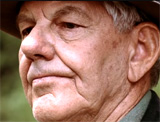
|
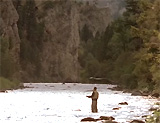
|
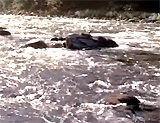
|
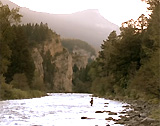
|
|
Concluding Images of Older Norman Remembering
His Past
|
|
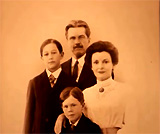
The Maclean Family
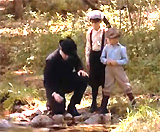
Along the Banks of the Big Blackfoot River
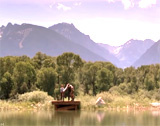
Instruction on Catching Fish
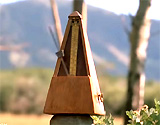
Metronome
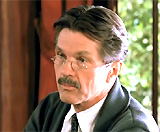
Rev. Maclean (Tom Skerritt)
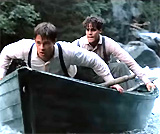
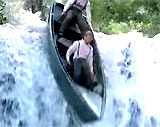
The Boys Shooting the Dangerous Falls on the Blackfoot River
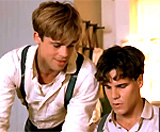
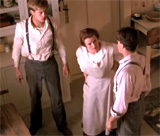
Two Boys Fighting in Kitchen
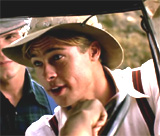
Paul's Statement - Never Be Late for Fishing in Montana
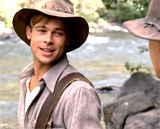
"I'll never leave Montana, brother"
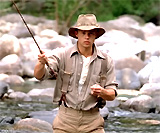
Paul Catching Prized Rainbow Trout
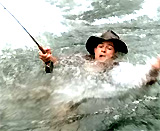
Swept Downstream
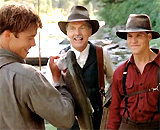
"I was witnessing perfection"
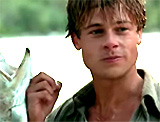
"Like a work of art"
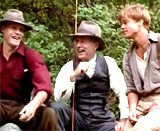
"The moment could not last"
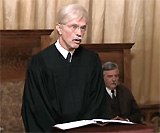
Rev. Maclean's Last Sermon Heard by Norman
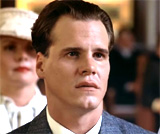
Norman's Sadness
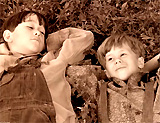
Sepia-Toned Memories of Boyhood
|




















